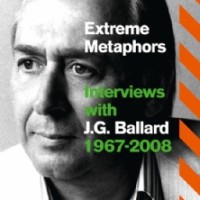Testing the Metaphor, by JP O’Malley
In the program Frost on Interviews, recently rebroadcast on British television, the distinguished journalist David Frost attempts to understand what makes a compelling interview. In particular, the program focuses on the actions of the interviewer: should one take a relaxed or heavy-handed approach with their guest?
This approach would not have fit too comfortably in an interview with the late J. G. Ballard, whose Extreme Metaphors is light-years away from the Frost approach.
For J. G. Ballard—arguably one of the most important prose fiction writers to contribute to British culture in the post-war period—an interview wasn’t just an opportunity to flog his latest novel, talk about his characters, or name check his literary heroes.
Any time Ballard indulged a journalist—usually at his home in Shepperton—for an intimate chat, the occasion became almost an experiment where the writer tests his hypothesis with his interlocutor.
We see a remarkable example of this in a conversation from 1974, when journalist Carol Orr asks Ballard for a prediction about the future of Western culture. He responds by speaking about a society where people “want to be alone and watch television.”
Orr, horrified at what she clearly perceived to be an immoral and apocalyptic outcome, says she wants to be neither in a traffic jam, or “alone on a dune, either.” To which Ballard replies, “Being alone on a dune is probably a better description of how you actually lead your life than you realize.”
The interview ends shortly afterwards, but it’s exemplary of Ballard taking the format and twisting it to his advantage in the same way a writer does with an essay: meandering around different ideas, following the intellect at all times, but never attempting to arrive with a definitive polemic, or thesis, at the final destination.
For Ballard, the interview is a fitting moment to take images from his artistic landscape and see how they fit into the society of which we are all supposedly a part: the nightmare marriage between sex and technology in Crash, the empty swimming pools and vast deserted cities in Cocaine Nights, or the preoccupation with class consciousness in High Rise. All become topics open for discussion.
The book includes over forty-four different interviews spanning a period of forty-one years, and many of the quotes it contains read like aphorisms: “Most of us lead comparatively isolated lives”; “There is a darker corner of the human psyche that intrigues us”; “The automobile represents an extension of one’s own personality.”
Read the complete article in The University Bookman
